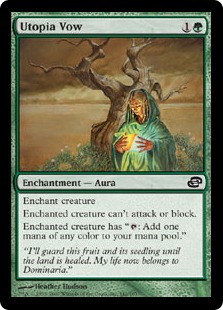While Magic is fundamentally one of battle-based conflict, multiplayer formats like Commander add in all sorts of variables to contend with beyond simply pounding your opponent’s skeleton into the a fine doughnut-grade powdery dust.
Hmm, calcium-laced doughnuts….
For one, Commander games begin with twice the normal life totals, and decks are almost twice in size what the Threescore Players of the world are used to using. Moreover, with games that go on far longer and are far more unpredictable than a normal duel, multiplayer styles can seem like a wholly alien approach if someone isn’t used to it.
More pertinent, however, is the addition of table politics to the game. This adds an entire metagame aspect to plans and strategies, as players contend with the schemes and ambitions of several players at once. Throughout every mutliplayer game, table politics enables a host of behavior. Alliances are made and broken, people are cajoled and threatened, and players learn to expect the unexpected. In these settings, the enemy of your enemy is…well, still your enemy, but they may be able to help you out this one time because of that guy over there…
This opens up a litany of cards for players to pull cards from. One particular style of them are the “Heads I Win, Tails You Lose” variety. These cards provide either the player or their opponents an option, but no matter the outcome, you benefit in some way. This subset of multiplayer cards include “punisher” cards like Browbeat or Blazing Salvo, where the spell resolves unless another player volunteers to take damage instead. There’s also the more insidious style of punisher-like cards where they lose life rather than take damage (i.e. Breathstealer’s Crypt, Temporal Extortion, or Essence Vortex.)
Another subset of Heads I Win are the classic “tax” cards. Whether it’s Spelltithe Enforcer, Propaganda, Soul Tithe, or the eponymous Rhystic Study, taxing cards either force your opponent to pay additional mana for something or they suffer the consequences. At worst, taxing forces your opponent to spent extra mana. At best, they don’t and hamstrings themselves by allowing you to gain a bigger table advantage.
Yet another group of these devilish cards are those who can serve two difference purposes, depending on whether it’s being used offensively or defensively. With False Demise or Shade’s Form, for example, you can put them on your own creature to ensure that when they die they’ll return to the battlefield – or you can slap them on an opponent’s creature and gain control of it when it dies. Similarly, you have a card like Bonds of Faith, which can either pacify a non-Human creature or buff a Human instead.
While not as easily codified as their more plentiful or famous brethren, these more subtle and more situational win-win cards can nevertheless be powerful additions to a deck’s arsenal. To that end, let’s take a look at another good example.
Today we have: Utopia Vow

Name: Utopia Vow
Edition: Planar Chaos
Rarity: Common
Focus: Combat Control / Mana Acceleration
Highlights: Utopia Vow was an easily overlooked card from a time in the game when so much else was going on. The incredibly rich Time Spiral block was so loaded with old mechanics, nostalgic story elements, and a bevvy of new ideas that players are still finding new uses for cards from those sets.
At first glance, Utopia Vow either appears as a weaker Birds of Paradise-granting card seen before as Multani’s Harmony or in equipment form as Paradise Mantle, or simply as a weaker, color-shifted Pacifism.
In a vacuum, neither observation is wrong. However, the fact that it can be implemented for either purpose illustrates its true hidden potential as a Commander card.
On the mana-generating side, using Utopia Vow admittedly prevents the creature from attacking or blocking in exchange for mana, and some people won’t like that change. Yet there’s little loss if it’s used on a creature that you’re not apt to use in combat anyways or a token creature that you won’t miss all that much. This tradeoff can be especially useful in the early to middle stages of Commander games.
On the other hand, should mana not be an issue, Utopia Vow can be leveraged offensively by removing an opponent’s creature from combat. Green has experimented over the years with different ways to take someone else’s creature out of the equation (with the most recent philosophy being that ‘fight’ is the mechanic of choice). In that sense, Utopia Vow was yet another experiment. One, by the way, that is very adept at stopping creatures that fighting may be able to stop. Your opponent may be gaining the mana production instead, but it’s a worthwhile swap to nullify their most potent creature.
Heads I Win, Tails You Lose. Utopia Vow certainly fits that mantra. This predecessor to Lignify didn’t see much attention at the time, but by being able to use it for your own advantage or to stifle the opponent makes it one card that should not be overlooked in multiplayer games like Commander.
Plus, it’s also pretty funny turning someone’s insane creature into a pacifistic druid.
Keep an eye out for us to be regularly featuring other more accessible-but-worth-it Commander cards going forward. In the meantime, we’ll keep the light on for you.
![]()
You can discuss this article over on our social media!
Do you have a particular Commander card to suggest for us to shine a future Spotlight on? You can send suggestions to ryan@cardboardrepublic.com
